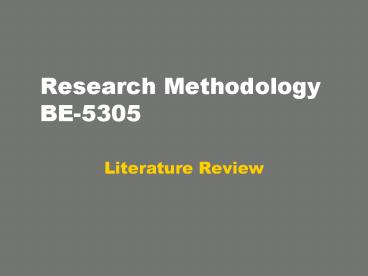Research Methodology BE-5305 - PowerPoint PPT Presentation
1 / 15
Title:
Research Methodology BE-5305
Description:
Research Methodology BE-5305 Literature Review Introduction Literature review surveys sources relevant to a particular issue, area of research or theory providing a ... – PowerPoint PPT presentation
Number of Views:96
Avg rating:3.0/5.0
Title: Research Methodology BE-5305
1
Research Methodology BE-5305
- Literature Review
2
Introduction
- Literature review surveys sources relevant to a
particular issue, area of research or theory
providing a description, summary, and critical
evaluation of each work e.g from - Scholarly articles
- Books
- Dissertations and Thesis
- Conference Proceedings
3
Stages of Literature Review
- Problem formulation
- Literature Search
- Data Evaluation
- Analysis and Interpretation
4
Elements of Literature Review
- Overview of the subject, issue or theory under
consideration, along with the objectives of the
lit. review - Division of works under review into categories
(support vs against) - Explanation of how each work is similar to and
how it varies form the others - Conclusions
5
Consideration should be given to..
- Provenance- authors credentials
- Objectivity
- Persuasiveness
- Value
6
Purpose of Lit. Review
- Place each work in the context of its
contribution to the understanding of the subject
under review - Describe the relationship of each work to others
- Identify new ways to interpret, and shed light on
any gaps - Resolve conflicts
- Point the way forward for further research
7
Why do we need good lit. review?
- To demonstrate that you know the field.
- To justify the reason for your research
- To allow you to establish your theoretical
framework and methodological focus
8
Starting point..
- Pursue recent review articles
- Too much to handle
- Very little there
- Doing something new
- Limiting yourself to too narrow an area
- Not a worthwhile area of research
9
Quality of Literature
- Is the problem clearly spelled out?
- Are the results presented new?
- Was the research influential?
- How large a sample was used?
- How convincing is the argument made?
- How were the results analyzed?
- What perspective are they coming from?
- Are the generalizations justified by the evidence
on which they are made? - What is the significance of this research?
- What are the assumptions behind the research?
- Is the methodology well justified as the most
appropriate to study the problem? - Is the theoretical basis transparent?
- In critically evaluating, you are looking for
- (i) Strengths, significance and contributions
- (ii) Limitations, flaws and weaknesses
- (iii) Whole lines of enquiry
10
Simple way to do lit. review
- Start with a series of paragraphs???
- Green (1975) discovered.
- In 1978, Black conducted experiments and
discovered that - Later Brown (1980) illustrated this in .
- NO!!! This demonstrates neither your
understanding of the literature nor your ability
to evaluate other peoples work
11
This way is better..
- There seems to be general agreement on x, (for
example, White 1987, Brown 1980, Black 1978,
Green 1975) but Green (1975) sees x as a
consequence of y, while Black (1978) puts x and y
as having no effects on one another. While
Greens work has some limitations in that it,
its main value lies in. - This shows that you have thought about it, can
synthesize the work and pass judgement on the
relative merits of research conducted in your
field
12
Mind Mapping
- On x and y..
Green 1975
y? x
x no relp to y
Relationship of x and y
Black 1978
x?y
13
Table Comparisons on x and y
White 1987 Brown 1980, Black 1978 Green 1975)
x (main findings) x is x is x is x is
x?y y as a consequence of x y as a consequence of x y as a consequence of x
y?x x as a consequence of y
No rel.p x and y no effects on one another
Conclusions
14
Look back
- Ask yourself questions like these
- What is the specific thesis, problem, or research
question that my literature review helps to
define? - What type of literature review am I conducting?
- What is the scope of my literature review?
- How good was my information seeking?
- Have I critically analyzed the literature I use?
- Have I cited and discussed studies contrary to my
perspective? - Will the reader find my literature review
relevant, appropriate and useful?
15
THE END































